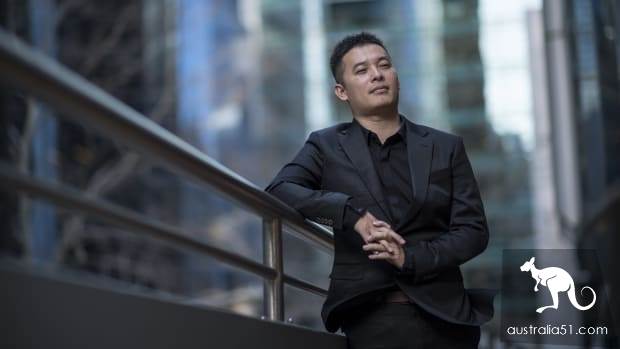
The growth made the 37-year-old born in Beijing, a Chinese-American "a young rich list". (
High electricity prices helped Zhang Anson, a Chinese-American wholesaler of solar panels, set up Australia`s fastest-growing private company. However, he reinvested the profits on the green energy retail sector he expected to flourish.
It is shown in the exclusive report of the IBISWorld Research Institute published by the Australian Financial Review. Revenue from (One Stop Warehouse Group), Zhang Anson`s one-stop warehouse group, rose 108 percent to A $391 million in 2018 / 19, topping the list of private companies.
The growth brought the 37-year-old Chinese-born-born Queensland-born Australian Financial Review to the "a young rich list" of Financial Review Young Rich List, which will be released on October 25. According to nearly half of the company`s equity, its personal wealth is estimated at $35 million.
Anthony Pratt`s packaging paper company, Visy, topped the list of private companies for 10 years. The list is sorted by the income of each non-listed company, partnership, association and private company in Australia.
However, rising iron ore prices have led to the status of threat, a Hancock exploration company owned by Reinhart (Gina Rinehart). In 2018 / 19, the mining company earned A $6.08 billion, just A $820 million less than Visi Paper maker.
In 2017, Pratt promises to spend $20 a year in creating five thousand new manufacturing jobs for Australia, while Rinehart will invest $1 billion to build Roy Hill`s iron ore, which has made her increase in revenue this year.
In one-stop warehouse industry, private companies take risks. With the cancellation of the solar panel`s subsidies and the fall in electricity prices, the solar roof was initially very popular, and Mr. Zhang was diversified.
"Solar energy alone will not give me more room for growth," he said.
In the past two years, Mr. Zhang also started a wholesale battery to store solar energy and set up a retailer called "discovery of energy" Energy, who had a feeling that more consumers would like to have more renewable energy for home or enterprise charging.
Zhang learned about distribution channels from retailers that sell ASUS tablets, and then teamed up with software engineer Yu (Jeff Yu) to set up a "one-stop warehouse" in 2013.
Recently, the company`s revenue growth was strong, thanks to the acquisition of half of the company by (Gcl System Integration), a Singapore-based GCL systems integration company, in 2016. Zhang Ansen said the company is the second largest renewable energy company in Southeast Asia.
The "one-stop warehouse" purchases the GCL panel under the conditions that are allowed to be repaid within 6 months, and Anson Zhang says it releases the cash flow to achieve economic growth.
In 2018, the "one-stop warehouse" achieved a after-tax profit of A $4.7 million and revenue of A $244 million. The company currently has nearly A $50 million in stock, but Zhang Anson said the decline in solar energy should not be overestimated. He pointed out that the small technology certification system, which is used to subsidize the cost of solar installations, will not be completely eliminated until 2030. Still, IBISWorld forecasts that the solar installation industry will decline at an annual rate of 1.2 percent over the next five years, compared with an average annual growth rate of 3.4 percent in the previous five years.
It is reported that the current "one-stop warehouse" is one of the largest PV distribution companies in Australia, and is set up in February 2013 and is currently equipped with R & D center in Chengdu.

